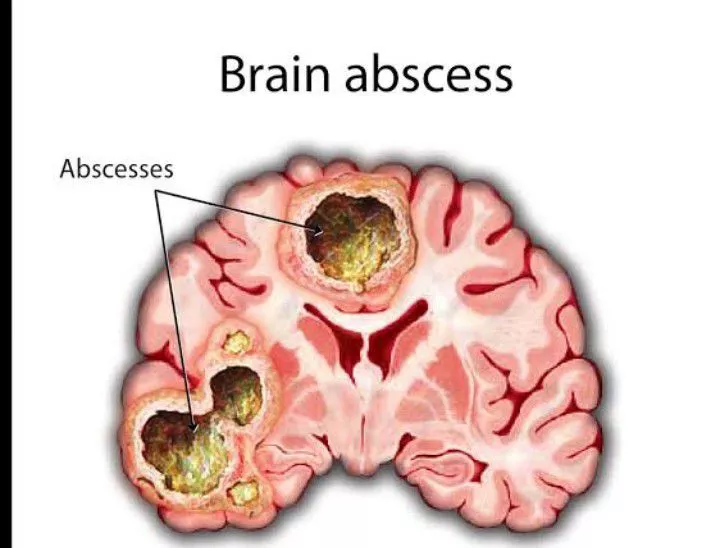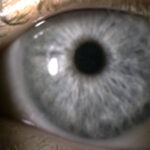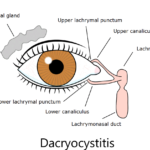A brain abscess is a severe and potentially life-threatening condition characterized by a localized collection of pus within the brain tissue. It results from bacterial, fungal, or parasitic infections that enter the brain through direct spread, bloodstream dissemination, or traumatic injury. Rapid diagnosis and effective treatment are crucial to prevent permanent neurological damage and fatal complications.

Causes of Brain Abscess
Brain abscesses can develop due to various factors, including:
1. Direct Extension from Nearby Infections
Infections originating near the brain can extend into the brain tissue, leading to abscess formation. Common sources include:
- Sinus infections (sinusitis) – Particularly frontal sinusitis, which can spread to the frontal lobe.
- Middle ear infections (otitis media) – Can extend to the temporal lobe or cerebellum.
- Dental abscesses – Bacterial infections from teeth or gums can spread through venous pathways.
2. Hematogenous Spread (Bloodstream Infection)
Bacteria, fungi, or parasites from distant infected sites can travel through the bloodstream and lodge in the brain. Conditions associated with this include:
- Endocarditis – Infected heart valves can release bacteria into the bloodstream.
- Lung infections – Pulmonary abscesses and bronchiectasis can lead to septic emboli.
- Immunosuppressive conditions – Individuals with HIV/AIDS, cancer, or organ transplants are at higher risk of opportunistic infections.
3. Trauma and Neurosurgical Procedures
- Head injuries – Open skull fractures or penetrating injuries introduce pathogens directly into brain tissue.
- Post-surgical infections – Craniotomy and other neurosurgical procedures carry infection risks.
Common Pathogens Involved
- Bacteria: Streptococcus, Staphylococcus aureus, Escherichia coli, Klebsiella pneumoniae, Pseudomonas aeruginosa, and anaerobes.
- Fungi: Aspergillus and Candida species, especially in immunocompromised individuals.
- Parasites: Toxoplasma gondii, often affecting patients with weakened immune systems.
Symptoms of Brain Abscess
Brain abscesses present with a combination of general and neurological symptoms, depending on their size, location, and progression.
- Persistent headache – Often severe and unresponsive to standard painkillers.
- Fever and chills – Due to an underlying infection.
- Neurological deficits – Weakness, vision disturbances, speech problems, or difficulty coordinating movements.
- Seizures – Increased risk due to brain irritation.
- Altered mental status – Confusion, personality changes, or drowsiness.
- Nausea and vomiting – Often linked to increased intracranial pressure.
Diagnosis of Brain Abscess
1. Imaging Studies
- Magnetic Resonance Imaging (MRI) – Preferred due to its high sensitivity in detecting abscesses.
- Computed Tomography (CT) Scan – Provides rapid assessment, especially in emergency cases.
2. Laboratory Tests
- Blood cultures – Identify bacterial or fungal infections.
- Abscess aspiration – Stereotactic needle aspiration for microbial analysis.
- Lumbar puncture – Typically avoided due to the risk of brain herniation.
Treatment of Brain Abscess
1. Antimicrobial Therapy
- Broad-spectrum antibiotics – Initiated immediately and adjusted based on culture results.
- Antifungal or antiparasitic drugs – Used in cases of fungal or parasitic abscesses.
2. Surgical Intervention
- Aspiration or drainage – Recommended for abscesses larger than 2.5 cm or those causing severe symptoms.
- Complete excision – Performed if the abscess fails to respond to medical treatment.
3. Supportive Care
- Corticosteroids – Used to reduce brain swelling.
- Anticonvulsants – Administered to prevent seizures.
Prognosis and Complications
With timely treatment, the prognosis is generally favorable, but complications can occur, including:
- Neurological impairments – Persistent weakness, speech problems, or seizures.
- Hydrocephalus – Increased cerebrospinal fluid accumulation.
- Brain herniation – A life-threatening shift of brain structures.
Prevention Strategies
- Early treatment of sinus, ear, and dental infections – Reduces infection spread to the brain.
- Good dental hygiene – Lowers the risk of oral infections leading to brain abscesses.
- Vaccination – Protects against bacterial infections like pneumococcus and meningococcus.
- Infection control in surgery – Aseptic techniques minimize post-operative infections.

